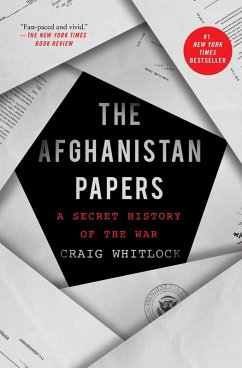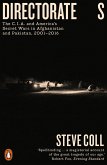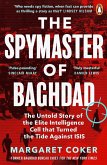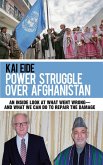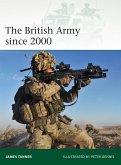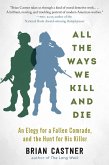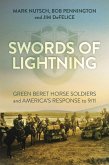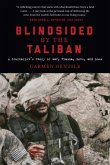Am 7. Oktober 2001 begannen die USA damit, Afghanistan zu bombardieren und starteten damit den längsten Krieg in der Geschichte der Vereinigten Staaten. Der Militäreinsatz dort dauerte länger als die Beteiligung an beiden Weltkriegen und der komplette Vietnamkrieg zusammen, nämlich ganze 20 Jahre.
Dass dieser Krieg ein einziges Fiasko war und wie es dazu kommen konnte, hat der…mehrAm 7. Oktober 2001 begannen die USA damit, Afghanistan zu bombardieren und starteten damit den längsten Krieg in der Geschichte der Vereinigten Staaten. Der Militäreinsatz dort dauerte länger als die Beteiligung an beiden Weltkriegen und der komplette Vietnamkrieg zusammen, nämlich ganze 20 Jahre. Dass dieser Krieg ein einziges Fiasko war und wie es dazu kommen konnte, hat der Investigativjournalist Craig Whitlock in seinem Buch „Die Afghanistan Papers. Der Insider-Report über Geheimnisse, Lügen und 20 Jahre Krieg“ zusammengetragen. Ein bedrückender Zusammenschnitt über Kämpfe, Illusionen, Lügen, Drogen und viel zu viele Tote auf allen Seiten. Eine Chronik des politischen Versagens auf ganzer Linie.
Drei aufeinanderfolgende Präsidenten der Vereinigten Staaten (Bush, Obama und Trump) haben gemeinsam mit ihren militärischen Befehlshabern die gesamte Öffentlichkeit über den Afghanistankrieg belogen. Punkt. Sie haben die Welt glauben lassen, ihr Einsatz sei zielgerichtet, verfolge einen Plan und werde früher oder später zum Erfolg führen. Dabei wussten sie selbst nicht einmal, wie dieser Erfolg aussehen würde! In der völlig konfusen Mission wusste selbst der damalige Verteidigungsminister Donald Rumsfeld nicht einmal sicher, wer eigentlich die Bösen waren. Ein namentlich nicht genannter hochrangiger Mitarbeiter des State Department nannte die Mission sinngemäß „Amerika zieht in den Krieg, ohne zu wissen, was es tut“ – und damit fasst er das ganze Debakel hervorragend zusammen. Was folgte war der längste und teuerste Krieg, an dem die USA jemals beteiligt waren. Ziel war es, das Land erst zu verlassen, wenn Stabilität gewährleistet wäre.
Das bedeutete, das Land müsste eine stabile Regierung nach amerikanischem Vorbild haben, dazu demokratische Wahlen, ein funktionierendes Oberstes Gericht, eine Korruptionsbekämpfungsbehörde, ein Frauenministerium und ein öffentliches Schulsystem mit Tausenden neuen Schulen und einem modernen Lehrplan. Schöne Worte. Denn im Endeffekt ging es darum, „die Überbleibsel der Taliban“ zu „bombardieren und versuchen, sie zu töten. Genau das haben wir getan, und es hat funktioniert. Sie sind weg. Und dem afghanischen Volk geht es jetzt sehr viel besser.“ Dieser ach so „gerechte Krieg“ sollte so lange dauern, bis „al-Qaida die gerechte Strafe erhalten hat. Es kann morgen so weit sein, es kann in einem Monat so weit sein, es kann ein oder zwei Jahre dauern. Aber wir werden uns durchsetzen.“ Die Geschichte hat alle eines Besseren belehrt. Das Buch endet mit dem offiziellen „Kriegsende“ und dem Abzug der Truppen im August 2021, seither ist noch vieles geschehen. Auf einen konfusen Feldzug folgte ein ebenso konfuser Abzug, Kabul fiel innerhalb kürzester Zeit an die besiegt geglaubten Taliban zurück, die sich systematisch auf diesen Augenblick vorbereitet hatten. Afghanistan ist heute instabiler denn je. Der Krieg war ein Fiasko auf ganzer Linie.
Das Buch beinhaltet eine immense Recherchearbeit des investigativen Journalisten Craig Whitlock, der seinen Text mit zahllosen Fußnoten untermauert. Das ist auch nötig, denn die Fakten und vor allem die vielen Personen erschlagen einen beim Lesen fast. Seine Faktensammlung fußt überwiegend auf den „Lesson Learned“-Dokumenten, bestehend aus mehr als 2000 Seiten an bis dahin unveröffentlichten (von der Behörde redigierten) Gesprächsniederschriften. Sprachlich und konzeptionell ist das Buch fast ein Krimi oder gar ein Thriller, bestehend aus einem Wust an strategischen Fehlentscheidungen und politischer Schönfärberei. Ja, stellenweise ist es etwas reißerisch, das tut seiner Qualität keinen Abbruch. Die Sprache des Autors ist die eines Journalisten, mal sachlich, mal flapsig, aber immer nah an der Leserschaft. Konzeptionell geht er chronologisch vor und schafft damit eine ebenso lohnende und aufklärende wie deprimierende Lektüre. Von mir fünf Sterne.

